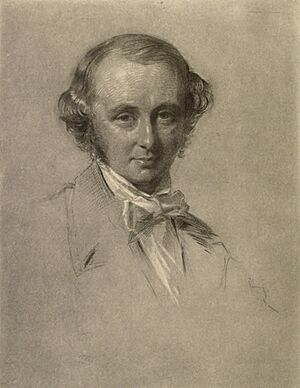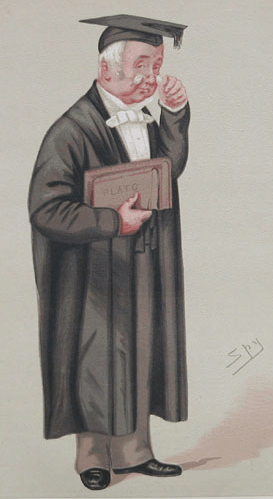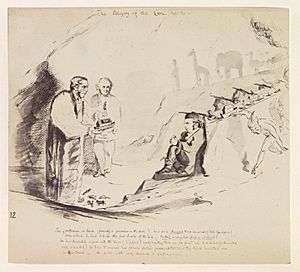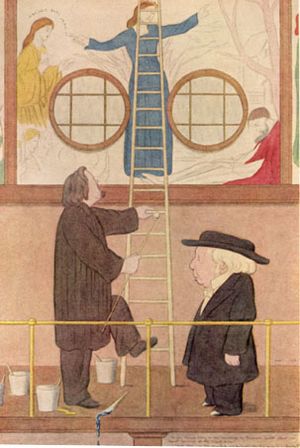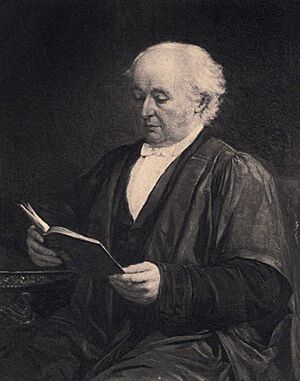Benjamin Jowett facts for kids
Quick facts for kids
Benjamin Jowett
|
|
|---|---|
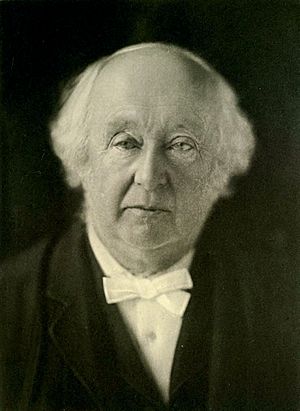
Benjamin Jowett, 1893
|
|
| Born | 15 April 1817 Camberwell, London, England
|
| Died | 1 October 1893 (aged 76) Alton, Hampshire, England
|
| Nationality | British |
| Occupation | Academic |
| Known for | Being a teacher, theologian and translator of Plato and Thucydides |
| Academic background | |
| Alma mater | Balliol College, Oxford |
| Academic advisors | A. P. Stanley |
| Academic work | |
| Notable students | Thomas Hill Green Edward Caird |
| Signature | |
Benjamin Jowett (born April 15, 1817 – died October 1, 1893) was an English teacher and important leader at the University of Oxford. He was also a religious thinker and translated famous ancient Greek books by Plato and Thucydides. He became the head, or Master, of Balliol College, Oxford.
Contents
Early Life and Education
Benjamin Jowett was born in Camberwell, London. He was the third of nine children. His father was a furrier and his family had been supporters of the Evangelical movement in the Church of England for many years. His mother, Isabella Langhorne, was related to John Langhorne, a poet and translator.
At age 12, Jowett went to St Paul's School. He quickly became known as a very smart student, especially in classical studies. When he was 18, he won a special scholarship to Balliol College, Oxford. He stayed at Balliol for the rest of his life.
He started his studies in 1836. By 1838, he was made a Fellow, which is a senior member of the college, even before he finished his degree. He graduated with top honors in 1839. During this time, he explored different religious ideas, but he was most influenced by Arthur Penrhyn Stanley.
New Ideas and Challenges
From 1846, Jowett became very involved in changing how the university worked. These changes led to new rules for Oxford in 1854.
Jowett then focused on religious studies. He spent time in Germany learning about new ways of thinking about religion. His ideas were quite new for his time. In 1855, he published a book about St Paul. This book was very original but caused some strong disagreement from traditional religious groups.
Jowett became good friends with Florence Nightingale, the famous nurse. They wrote many letters to each other. He also helped with another important change: allowing people to join the Indian Civil Service based on their skills, not just their family background. Jowett had a strong interest in India because his two brothers had served and died there.
Life at Oxford
In 1855, Jowett became the Regius Professor of Greek at Oxford. He had been a tutor at Balliol since 1842. He was known as "the great tutor" because he was excellent at teaching. He understood his students well and helped them discover their own strengths.
In 1860, Jowett contributed to a book called Essays and Reviews. This book also caused a lot of debate and criticism because it explored new ways of interpreting religious texts. Even though he faced opposition, Jowett remained loyal to his friends who were also criticized. His salary as Greek professor was held back for a while because of these controversies.
Jowett's influence at Oxford grew steadily. He worked to remove the rule that students had to pass a religious test to get their degrees or hold university jobs. This effort helped lead to the Universities Tests Act 1871.
After years of trying, Jowett was finally elected Master of Balliol College in 1870. This was a position he had wanted for a long time. As Master, he made Balliol College a very special place for learning. He encouraged new scientific studies and questioned old ideas, which had a big impact on liberal thinking.
Translator and Author
While teaching, Jowett also worked on a major project: a complete translation of Plato's Dialogues. He worked on this for at least ten years. His goal was to make Plato's ancient Greek writings understandable to English readers. When it was published in 1871, it was a great success. Many people felt he had made Plato a classic in English.
Jowett also continued to preach, even though he was not allowed to preach in the main university church for a time. He preached in London and annually in Westminster Abbey.
He also started translating Aristotle's Politics and revised his Plato translation. He worked on a translation of Thucydides for many years. He had other writing plans, like a book on world religions, but he was too busy with his work at the university.
In 1882, he became the Vice-Chancellor of Oxford University. This was a very demanding job, but he hoped to make many improvements for the university. One of his successful projects was working with Florence Nightingale to bring lectures to Oxford for students studying agriculture for the Indian Civil Service. This helped Indian students get a better education in farming and forestry.
Later Life and Legacy
The hard work of being Vice-Chancellor made him ill in 1887. After this, he gave up on writing any major new books. He focused on finishing his commentary on Plato's Republic and some essays on Aristotle.
Benjamin Jowett never married. He died on October 1, 1893, in Oxford. His funeral was a very important event in the city, with many respected people attending.
Jowett is remembered as a great teacher and a moral guide. Many important English leaders of his time were his students and said he greatly influenced them. He helped people think about religion in new ways and believed in making philosophy practical for everyday life.
Jowett is buried in St Sepulchre's Cemetery in Oxford.
Remembering Benjamin Jowett
- Jowett Walk in central Oxford is named after him.
- He appears as a character in books and plays, such as The New Republic and The Invention of Love.
- A radio play about his life, The Great Jowett, was made in 1939.
See also
 In Spanish: Benjamín Jowett para niños
In Spanish: Benjamín Jowett para niños
 | Leon Lynch |
 | Milton P. Webster |
 | Ferdinand Smith |


